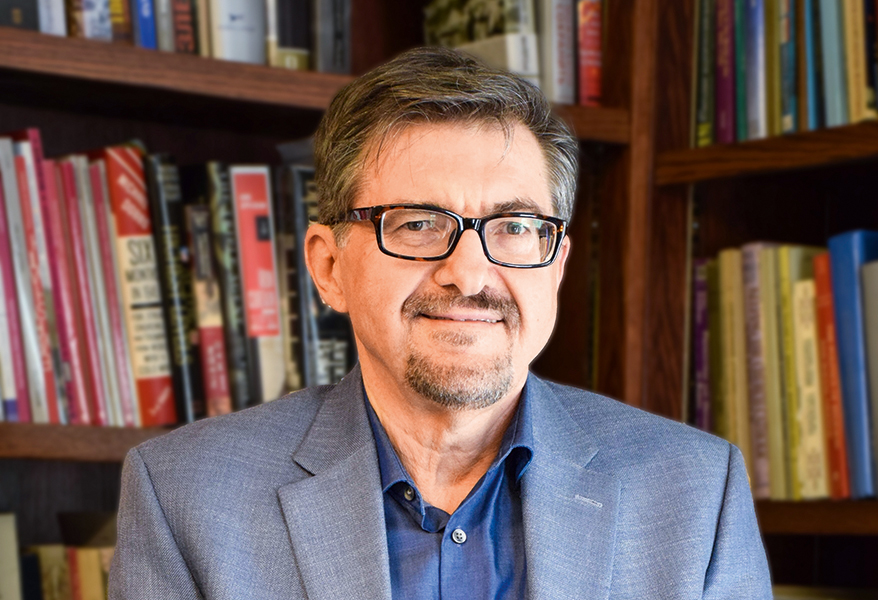For the past decade, Russian dictator Vladimir Putin has framed his country’s escalating campaign of aggression against Ukraine as a crusade for historical justice. Time and again, Putin has brandished his own highly distorted view of Ukraine’s place in Russian history in order to justify the invasion, occupation, and forced russification of the modern Ukrainian state.
Historian Serhii Plokhy, a professor of Ukrainian history at Harvard University, has long been at the forefront of efforts to debunk Putin’s weaponized version of history. Plokhy’s latest book, The Russo-Ukrainian War, attempts to place the current invasion in a broader historical context. He spoke to Business Ukraine magazine about Ukraine’s strengthening sense of national identity and the self-defeating consequences of Putin’s invasion.
Vladimir Putin has placed history at the heart of the Ukraine invasion but his vision of Ukraine as an inalienable element of Russia’s historical narrative is actually nothing new and dates back centuries. Can Russia’s imperial identity survive the loss of Ukraine?
Russia’s imperial tradition of thinking about Russian security in terms of spheres of influence and the desire to project military power far beyond that state’s borders can very well survive the current war and the loss of Ukraine. But the Russian imperial identity which imagines the Russian nation as consisting of modern-day Russians, Ukrainians, and Belarusians, will not survive. The war has killed whatever elements of the common East Slavic identity that had existed in Ukraine before 2022. Hundreds of thousands of killed and wounded Russians will have a similar impact on Russia’s own national identity as well.
Many commentators believe the current Russian invasion is genocidal in nature and have accused the Kremlin of seeking to destroy Ukrainian statehood and erase Ukrainian national identity. Putin himself frequently declares Ukrainians and Russians to be “one people.” Where does today’s invasion fit into the broader history of Russian attempts to turn Ukrainians into Russians?
Putin’s belief that Russians and Ukrainians are one and the same people is dead, and I see no signs of it coming back any time soon. This is the end of a long tradition that goes back to the seventeenth century. The idea of “one people” was used by the Russian Empire to deny the right of Ukrainians to publish in Ukrainian, have separate national identity, and exist as a nation. The Bolsheviks discarded the imperial notion of the three-partite Russian nation (Russia, Belarus, and Ukraine) in the name of the communist international. Putin brought the older model of Russian identity back only to bury it once and for all.
Modern Ukraine and Russia both claim to be the true heirs of the Kyivan Rus state. Are these claims mutually exclusive?
Not if one thinks in terms of dynasty, religion, high culture, and literary language. Both nations look for the origins of these things in the history of Kyivan Rus. The problems start once one thinks in terms of local culture, spoken languages, and ethnicity. In the nineteenth century, Russian imperial intellectuals were surprised to discover that people around Kyiv did not speak Russian. To make an ethnic claim for Kyivan heritage, they invented a theory that the original population of Kyiv, which allegedly was Russian during the Kyivan Rus times, had migrated to Russia after the Mongol invasion. No one believes in that theory anymore. The ancestors of modern Ukrainians populated the area of today’s Ukraine long before it became the core of the Kyivan Rus.
Your new book on the Russo-Ukrainian War is subtitled “The return of history.” How significant was the general lack of international awareness regarding both Ukrainian history and the legacy of Russian imperialism in shaping Western policy toward Ukraine in the decades from 1991 to 2022?
Ukraine and Ukrainians, as has been suggested in the subtitle of a book written by Andrew Wilson in the 1990s, became an “unexpected nation” to many Western observers of the post-Soviet scene. Well into the 1990s, history textbooks throughout the West were still referring to Kyivan Rus as “Kievan Russia.” Meanwhile, most of the international newspaper coverage of independent Ukraine was coming from reporters based in Moscow. All this could not but influence Western policymakers and the positions they adopted toward Ukraine.
As late as 2018, US President Donald Trump suggested that Crimea was Russian because the population there spoke Russian. That remark ignored the fact that Crimea has an indigenous population of Crimean Tatars and was annexed by the Russian Empire in the late eighteenth century. It also opened the door for Putin’s claims to other predominantly Russian-speaking territories. The Russian colonization of Southern Ukraine and Crimea, forced Russification, and the suppression of the Ukrainian language and culture remained unknown to many Western leaders and Western audiences alike. Only now is the situation starting to change.
You have written that Ukraine will emerge from the war “more united and certain of its identity than at any other point in its modern history.” What position does this war occupy in Ukraine’s centuries-long statehood struggle?
When Ukraine finally achieved independence in 1991, it was as a result of what was the fifth attempt to become an independent nation in the twentieth century alone. All previous attempts had failed, at best after a few months of independent existence. The key question posed by Russian aggression in February 2022 was whether Ukraine would be able to protect its independence and continue as a separate country and a separate nation. The war is not over yet, but it is pretty clear by now that Ukraine will remain on the map of Europe. Admittedly, Ukraine needs and deserves a lot of support in defending not only the choice of its people to become independent, but also the basic principles of international law.
